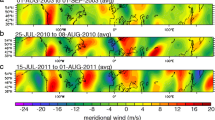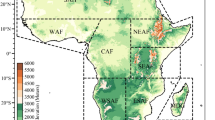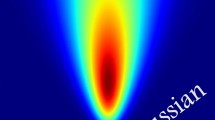Abstract
There has been a growing interest in model-wise uncertainty decomposition, which quantifies contribution of individual models such as emission scenarios, global circulation models, bias correction techniques and hydrological models, to the total uncertainty of a hydrological projection. However, little research has been conducted for model-wise uncertainty decomposition in spite of its usefulness. In this paper, we propose a novel method for decomposing the total uncertainties into model-wise uncertainties. The proposed model-wise uncertainty decomposition method can be applied with general uncertainty measures, which include mean absolute deviation and variance measures. Moreover, the proposed method provides an intuitive interpretation of the quantified model-wise uncertainties. The results of analyzing real data by the proposed method are presented.




Similar content being viewed by others
Data availability
The data used for this study are available at: https://github.com/ilsangohn/modelwise_ud.
Code availability
Data analysis was conducted by using R 4.0.2 software with the R package ‘UncDecomp’ (Kim et al. 2019a). The R code used to produce the results is available at https://github.com/ilsangohn/modelwise_ud.
Notes
Throughout this article, we refer to both emission scenarios, GCMs, bias correction techniques and hydrological models as “models” to simplify sentences, e.g., we write “model-wise uncertainties” instead of “model/scenario/technique uncertainties”.
References
Bastola S, Murphy C, Sweeney J (2011) The role of hydrological modelling uncertainties in climate change impact assessments of Irish river catchments. Adv Water Resour 34(5):562–576
Beven K, Binley A (1992) The future of distributed models: model calibration and uncertainty prediction. Hydrol Process 6(3):279–298
Bosshard T, Carambia M, Goergen K, Kotlarski S, Krahe P, Zappa M, Schär C (2013) Quantifying uncertainty sources in an ensemble of hydrological climate-impact projections. Water Resour Res 49(3):1523–1536
Collins W, Bellouin N, Doutriaux-Boucher M, Gedney N, Halloran P, Hinton T, Hughes J, Jones C, Joshi M, Liddicoat S et al (2011) Development and evaluation of an earth-system model-hadgem2. Geosci Model Dev 4(4):1051
Dobler C, Hagemann S, Wilby R, Stötter J (2012) Quantifying different sources of uncertainty in hydrological projections in an alpine watershed. Hydrol Earth Syst Sci 16(11):4343–4360
Giorgi F, Gutowski WJ Jr (2015) Regional dynamical downscaling and the cordex initiative. Annu Rev Environ Resour 40:467–490
Hattermann FF, Krysanova V, Gosling SN, Dankers R, Daggupati P, Donnelly C, Flörke M, Huang S, Motovilov Y, Buda S et al (2017) Cross-scale intercomparison of climate change impacts simulated by regional and global hydrological models in eleven large river basins. Clim Change 141(3):561–576
Hidalgo HG, Dettinger MD, Cayan DR (2008) Downscaling with constructed analogues: Daily precipitation and temperature fields over the united states. California Energy Commission PIER Final Project Report CEC-500-2007-123
Katsavounidis I, Kuo CCJ, Zhang Z (1994) A new initialization technique for generalized lloyd iteration. IEEE Signal Process Lett 1(10):144–146
Kim S, Kim Y, Ohn I (2019a) UncDecomp: uncertainty decomposition. https://cran.r-project.org/web/packages/UncDecomp/
Kim Y, Ohn I, Lee JK, Kim YO (2019b) Generalizing uncertainty decomposition theory in climate change impact assessments. J Hydrol 3:100024
Kingston D, Taylor R (2010) Sources of uncertainty in climate change impacts on river discharge and groundwater in a headwater catchment of the upper nile basin, uganda. Hydrol Earth Syst Sci 14(7):1297–1308
Kuczera G, Mroczkowski M (1998) Assessment of hydrologic parameter uncertainty and the worth of multiresponse data. Water Resour Res 34(6):1481–1489
Kundzewicz ZW, Stakhiv EZ (2010) Are climate models ‘ready for prime time’ in water resources management applications, or is more research needed? Hydrol Sci J 55(7):1085–1089
Lee S, Kim J, Hur JW (2013) Assessment of ecological flow rate by flow duration and environmental management class in the Geum river, Korea. Environ Earth Sci 68(4):1107–1118
Lee JK, Kim YO, Kim Y (2017) A new uncertainty analysis in the climate change impact assessment. Int J Climatol 37(10):3837–3846
Lettenmaier DP, Gan TY (1990) Hydrologic sensitivities of the Sacramento-San Joaquin river basin, California, to global warming. Water Resour Res 26(1):69–86
Mandal S, Simonovic SP (2017) Quantification of uncertainty in the assessment of future streamflow under changing climate conditions. Hydrol Process 31(11):2076–2094
Maurer EP, Hidalgo HG (2008) Utility of daily versus monthly large-scale climate data: an intercomparison of two statistical downscaling methods. Hydrol Earth Syst Sci 12(2):551–563
Maurer EP, Hidalgo HG, Das T, Dettinger MD, Cayan DR (2010) The utility of daily large-scale climate data in the assessment of climate change impacts on daily streamflow in California. Hydrol Earth Syst Sci 14(6):1125–1138
Minville M, Brissette F, Leconte R (2008) Uncertainty of the impact of climate change on the hydrology of a nordic watershed. J Hydrol 358(1):70–83
Moore JK, Lindsay K, Doney SC, Long MC, Misumi K (2013) Marine ecosystem dynamics and biogeochemical cycling in the community earth system model [cesm1 (bgc)]: comparison of the 1990s with the 2090s under the rcp4.5 and rcp8.5 scenarios. J Climate 26(23):9291–9312
Najafi M, Moradkhani H, Jung I (2011) Assessing the uncertainties of hydrologic model selection in climate change impact studies. Hydrol Process 25(18):2814–2826
Nijssen B, Odonnell GM, Hamlet AF, Lettenmaier DP (2001) Hydrologic sensitivity of global rivers to climate change. Clim Change 50(1–2):143–175
Nóbrega M, Collischonn W, Tucci C, Paz A (2011) Uncertainty in climate change impacts on water resources in the Rio Grande Basin, Brazil. Hydrol Earth Syst Sci 15(2):585
Ohn I, Kim S, Seo SB, Kim YO, Kim Y (2020a) Bayesian uncertainty decomposition for hydrological projections. J Korean Stat Soc 49(3):953–975
Ohn I, Seo SB, Kim S, Kim YO, Kim Y (2020b) Uncertainty decomposition in climate-change impact assessments: a bayesian perspective. Commun Stat Appl Methods 27(1):109–128
Perrin C, Michel C, Andréassian V (2003) Improvement of a parsimonious model for streamflow simulation. J Hydrol 279(1):275–289
Prudhomme C, Davies H (2009) Assessing uncertainties in climate change impact analyses on the river flow regimes in the UK, part 2: future climate. Climatic Change 93(1):197–222
Salathé EP Jr, Mote PW, Wiley MW (2007) Review of scenario selection and downscaling methods for the assessment of climate change impacts on hydrology in the united states pacific northwest. Int J Climatol J R Meteorol Soc 27(12):1611–1621
Seo SB, Kim YO, Kim Y, Eum HI (2019) Selecting climate change scenarios for regional hydrologic impact studies based on climate extremes indices. Clim Dyn 52(3–4):1595–1611
Sugawara M (1979) Automatic calibration of the tank model/l’étalonnage automatique d’un modèle à cisterne. Hydrol Sci J 24(3):375–388
Sverdrup-Thygeson H (1981) Strong law of large numbers for measures of central tendency and dispersion of random variables in compact metric spaces. Ann Stat 9(1):141–145
Watanabe S, Hajima T, Sudo K, Nagashima T, Takemura T, Okajima H, Nozawa T, Kawase H, Abe M, Yokohata T et al (2011) Miroc-esm 2010: model description and basic results of cmip5-20c3m experiments. Geosci Model Dev 4(4):845
Wilby RL, Harris I (2006) A framework for assessing uncertainties in climate change impacts: low-flow scenarios for the river thames, UK. Water Resour Res 42(2)
Wood AW, Leung LR, Sridhar V, Lettenmaier D (2004) Hydrologic implications of dynamical and statistical approaches to downscaling climate model outputs. Clim Change 62(1):189–216
Yip S, Ferro CA, Stephenson DB, Hawkins E (2011) A simple, coherent framework for partitioning uncertainty in climate predictions. J Clim 24(17):4634–4643
Yukimoto S, Adachi Y, Hosaka M, Sakami T, Yoshimura H, Hirabara M, Tanaka TY, Shindo E, Tsujino H, Deushi M et al (2012) A new global climate model of the meteorological research institute: Mri-cgcm3 model description and basic performance. J Meteorol Soc Jpn Ser II 90:23–64
Funding
This work was supported by the National Research Foundation of Korea(NRF) grants funded by the Korea government(MSIT) (Nos. NRF-2020R1A2C3A01003550 and NRF-2021R1C1C1004492).
Author information
Authors and Affiliations
Contributions
IO and YK contributed to the study conception and design. Data collection and analysis were performed by IO, SK, SBS and YOK. The first draft of the manuscript was written by IO and YK. Reviewing and editing of the manuscript were performed by all authors. All authors read and approved the final manuscript.
Corresponding author
Ethics declarations
Conflict of interest
The authors declare that they have no conflict of interest.
Additional information
Publisher's Note
Springer Nature remains neutral with regard to jurisdictional claims in published maps and institutional affiliations.
Appendix 1: Proofs
Appendix 1: Proofs
1.1 Proofs for Sect. 3
1.1.1 Proof of Eq. (3.3)
By the identifiability condition (3.2), we have that for any \(\mathbf {x}\in \mathcal {X}\),
for any \(A\subset \{1,\dots , K\}\). By forward substitution where the equations are ordered by the number of elements in A, we have
and in general,
which completes the proof. \(\square \)
1.1.2 Proof of Theorem 1
Let two different subsets A and \(A'\) of \(\{1,\dots , K\}\) be given. Without loss of generality we assume that there is \(k\in \{1,\dots , K\}\) such that \(k\in A'\) but \(k\notin A.\) Let \(\mathcal {X}_{-k}:=\mathcal {X}_{\{1,\dots ,K\}\setminus \{k\}}\) and let \(\mathbf {x}_{-k}:=\mathbf {x}_{\{1,\dots ,K\}\setminus \{k\}}\) for \(\mathbf {x}\in \mathcal {X}\). Then by the identifiability condition (3.2),
This shows that all the covariance terms are zero, and hence proved the proof is done. \(\square \)
1.2 Proofs for Sect. 4
1.2.1 Proof of Eq. (4.2)
The assertion follows from that
where the third equality follows from Eq. (5) and the fifth equality follows from the identifiability condition (3.2). \(\square \)
1.2.2 On the properness of the stage uncertainties by the cumulative uncertainty approach
We have claimed the stage-wise uncertainties \(\{U_k^{cumul,stage }: k\in \{1,\dots , K\}\}\) are properly decomposed. Here we give the proof of the claim. First, the sum-to-total condition can be verified as
where the last equality follows from the fact that
for any A such that \(|A|\le K-1\).
The nonnegativity of the stage-wise uncertainties clearly follows from the nonnegativity of the model-wise uncertainties defined in (4.7), which is proven in Sect. 4.2. \(\square \)
1.2.3 Proof of Theorem 2
For the proof of of Theorem 2, we need the following technical lemma.
Lemma 1
For any \(r\in \mathbb {N}\cup \{0\}\) and \(s\in \mathbb {N}\cup \{0\}\), we have
Proof
From the identity \(\left( {\begin{array}{c}n\\ k\end{array}}\right) =\left( {\begin{array}{c}n-1\\ k-1\end{array}}\right) +\left( {\begin{array}{c}n-1\\ k\end{array}}\right) ,\) we have
Therefore
which completes the proof. \(\square \)
We are ready to prove Theorem 2. Note that
For each B and each \(j=0,\dots , K-|B|\), we need to obtain the number of subsets A with size \(j+1\) such that \(B\cap (A\setminus \{k\}) =\emptyset \) and \(A\ni k\), which is given by
This implies that
where the fifth equality is obtained by applying Lemma 1 with \(r=K-|B|\) and \(s=|B|-1\). This completes the proof. \(\square \)
Rights and permissions
About this article
Cite this article
Ohn, I., Kim, S., Seo, S.B. et al. Model-wise uncertainty decomposition in multi-model ensemble hydrological projections. Stoch Environ Res Risk Assess 35, 2549–2565 (2021). https://doi.org/10.1007/s00477-021-02039-4
Accepted:
Published:
Issue Date:
DOI: https://doi.org/10.1007/s00477-021-02039-4




